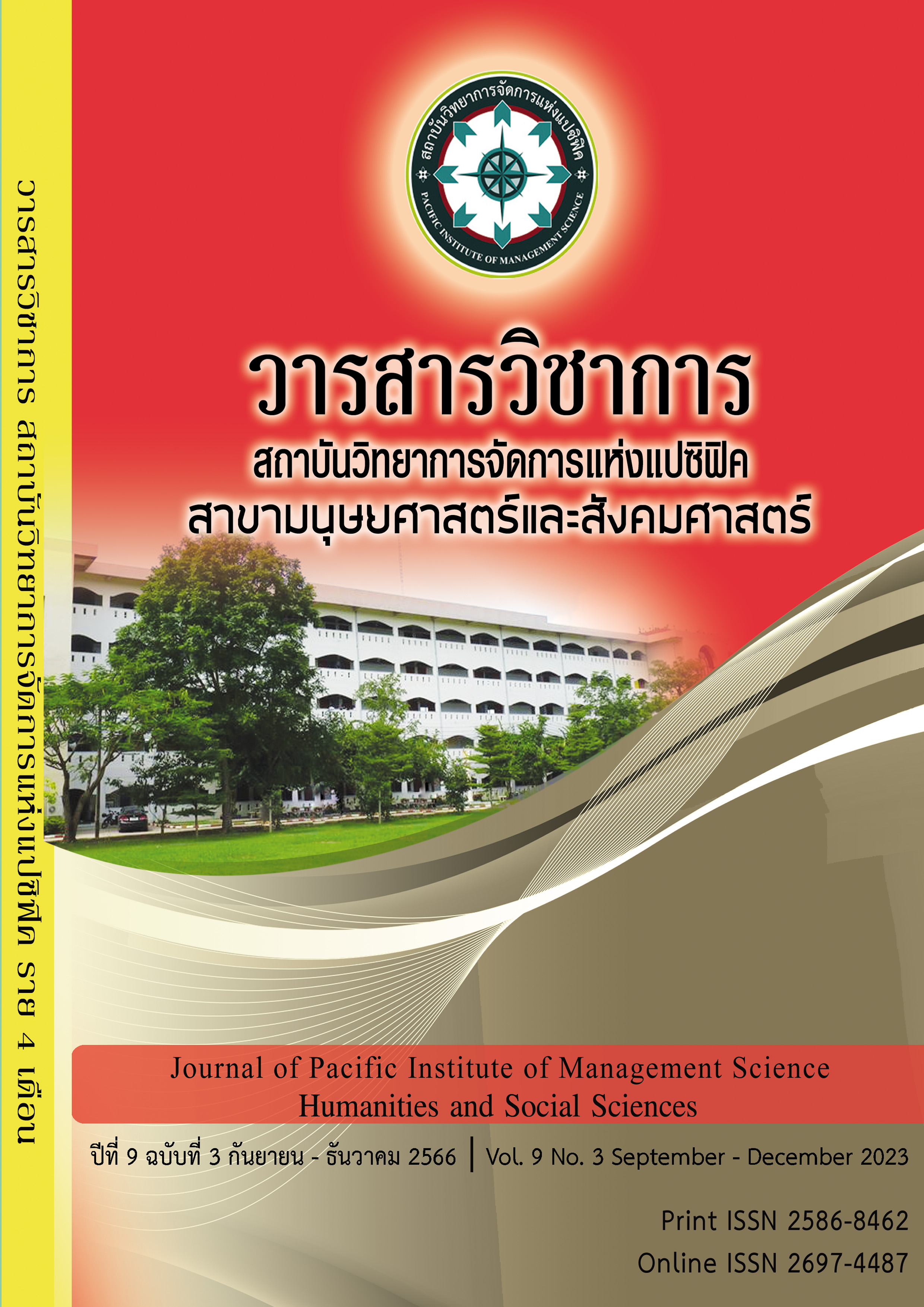Marketing Mix for Service Business and Use of Technologies Influencing People’s Decision to Use Mobile Banking in Bangkok
Keywords:
Marketing Mix Technology, Acceptance Mobile BankingAbstract
The purpose of this research was to study the marketing mix factors of service businesses that influence the decision to use mobile banking services in Bangkok and to explore the factors using technology that influence the decision to use mobile banking services in Bangkok through a random sampling of 401 people by studying demographic characteristics consist of gender, age, education level, income, and status. Including factors influencing the marketing mix (7P) are studied, namely products, prices, and distribution channels. Marketing Promotion, Process, People, Physical Characteristics, and the study of technology-related factors, including safety, the perception of ease, the perceived benefit, and the recognition of trust tools used in education, is a questionnaire. The reliability was 0.906. The statistics used in the data analysis were descriptive statistics, including the use of frequency distribution tables (Frequency), Percentage (Mean) and Standard Deviation (Standard Deviation), and inferential statistics. T-Test, F-test, and Multiple Regression analysis
The analysis showed that demographic factors, gender, age, education, income, and status, the results of the statistical hypothesis test concluded that there is no influence on the decision to use mobile banking services and marketing mix factors, consisting of products, prices, distribution channels, Integrated Marketing Communication, Process, People, and Physical Characteristics, had a positive influence on the decision to use mobile banking service of people in Bangkok and technology utilization factors, including safety in use and perceived ease of use perceived benefits recognition of trust in use had a positive influence on the decision to use mobile banking services of the people in Bangkok.
References
เกรียงศักดิ์ เจริญวงศ์ศักดิ์, 2018). แนวโน้มของการเงินการธนาคารในศตวรรษที่ 21. สืบค้นเมื่อ 20 ธันวาคม 2565 จากhtpps:// http://www.kriengsak.com/Trends-of-21st-Century-Banking-Finance.
ณรงค์เกียรติ์ อํ่าบุญ. (2563). ปัจจัยส่วนประสมทางการตลาดสำหรับธุรกิจบริการและปัจจัยด้านการยอมรับเทคโนโลยี ที่มีอิทธิพลต่อการตัดสินใจเลือกใช้Application MyMo.บัณฑิตวิทยาลัย, มหาวิทยาลัยกรุงเทพ
ธรรมรัตน์ พลอยเพ็ชร์. (2564). ปัจจัยในการตัดสินใจใช้บริการธุรกรรมทางการเงินผ่านโทรศัพท์เคลื่อนที่ของประชากรในจังหวัดปทุมธานี.การประชุมสวนสุนันทาวิชาการระดับชาติ ครั้งที่ 9.สถาบันวิจัยและพัฒนา มหาวิทยาลัยราชภัฏสวนสุนันทา.
รุ่งเรือง (2562). ปัจจัยที่มีอิทธิพลต่อความเชื่อมั่นในการใช้แอปพลิเคชัน KMA ของลูกค้าธนาคารกรุงศรีอยุธยาวิทยานิพนธ์ปริญญาบริหารธุรกิจมหาบัณฑิต, มหาวิทยาลัยศิลปากร.
นิศารัตน์ อมาตยกุล (2561). ปัจจัยด้านการอนุมัติสินเชื่อออนไลน์ (Digital Lending) และการยอมรับการใช้เทคโนโลยีที่ส่งผลต่อความพึงพอใจของผู้ใช้บริการสินเชื่อออนไลน์ (Digital Lending) ในเขตกรุงเทพมหานครและปริมณฑล วิทยานิพนธ์ปริญญาบริหารธุรกิจมหาบัณฑิต , มหาวิทยาลัยธรรมศาสตร์.
ธนัญชย์ กาฬเนตร, และยุพาวรรณ วรรณวาณิชย์ (2564). โมเดลการยอมรับเทคโนโลยีและความไว้วางใจที่มีผลต่อการใช้บริการ“เอสซีบีอีซี่”คณะบริหารธุรกิจ,
มหาวิทยาลัยเกษตรศาสตร์.
วิชาดา ไม้เงินงาม (2560). พฤติกรรมและการยอมรับเทคโนโลยีการใช้บริการธนาคารบนโทรศัพท์มือถือของผู้ใช้บริการกลุ่มเจเนอเรชั่นเอ็กซ์ในเขตบางแค , บัณฑิตวิทยาลัย มหาวิทยาลัยศิลปากร.
Vishal S, Samarth B, Iqbal H, Cristi S, Ramona B and al. (2022). the Acceptance of Mobile-Banking Applications in India—Unified Theory of Acceptance and Sustainable Use of Technology Model (UTAUT).Sustainability.Vol.14.
Phaninee N, Chavis K, Niracha H, and al. (2021). AFactors Affecting Sustainable Intention to Use Mobile Banking Services.SAGE Open July-September 2021: 1–13.
Downloads
Published
Issue
Section
License
Copyright (c) 2023 Pacific Institute of Management Science

This work is licensed under a Creative Commons Attribution-NonCommercial-NoDerivatives 4.0 International License.
บทความที่ได้รับการตีพิมพ์เป็นลิขสิทธิ์ของ สถาบันวิทยาการจัดการแห่งแปซิฟิค
ข้อความที่ปรากฏในบทความแต่ละเรื่องในวารสารวิชาการเล่มนี้เป็นความคิดเห็นส่วนตัวของผู้เขียนแต่ละท่านไม่เกี่ยวข้องกับสถาบันวิทยาการจัดการแห่งแปซิฟิค และคณาจารย์ท่านอื่นๆในสถาบันฯ แต่อย่างใด ความรับผิดชอบองค์ประกอบทั้งหมดของบทความแต่ละเรื่องเป็นของผู้เขียนแต่ละท่าน หากมีความผิดพลาดใดๆ ผู้เขียนแต่ละท่านจะรับผิดชอบบทความของตนเองแต่ผู้เดียว







